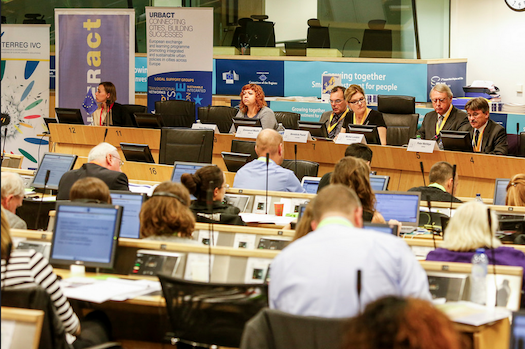Strengthening the Links between the Four Interregional Programmes
Edited on
09 October 2017Interview with Michel Lamblin, Programme Director, INTERREG IVC/Europe; Emmanuel Moulin, Head of Secretariat, URBACT ; Peter Mehlbye, Head of ESPON Coordination Unit and Petra Masácová, Head of the Managing Authority, INTERACT. The four discussed the changes in the structure and mandate of their programmes and what makes them different from the others in the programming period 2014 – 2020.

What are the main achievements of your programme and what evidence do you have for it?
Michel Lamblin, INTERREG IVC/Europe
Currently, under INTERREG IVC, more than 400 good policy practices have been transferred from one region to another and around 430 local/regional policy tools or instruments have been developed or improved thanks to the knowledge shared through cooperation. EUR 710m – more than double the programme budget – was spent by national/regional funds to implement the good practices learned under INTERREG IVC. More than 6000 staff members of local and regional bodies increased their capacity in regional policy implementation.
“The programme was questioned in 2006, as it was addressing too many themes in all fields of regional development, now it is an integral part of the Cohesion Policy framework – the added-value has now been demonstrated.”
Emmanuel Moulin, URBACT
One of the big achievements for URBACT is the impact of the Local Action Plans that the cities have to produce as one of the main outputs of their network activities. According to a recent study, one year after the end of their network activities, 90% of respondent cities declared their Local Action Plan was being implemented. And one third of these respondents have declared having implementing over 50% of the actions outlined in their action plan. This is of course to the benefit of cities and their citizens, the final beneficiaries of all our networks.
Another important result for URBACT for 2007-2013 is the impact of the knowledge produced by the programme through its capitalisation activities. A survey launched this spring on our capitalisation and communications activities demonstrates URBACT's capacity in promoting sustainable urban development not only to URBACT beneficiaries (cities and regions) but also to non-URBACT cities and organisations around Europe. From over 400 respondents, city decision-makers, practitioners and urban experts, 85% of them declare to have increased their knowledge on integrated urban development.
These are some strong elements that we will continue to develop in the future.
Petra Masácová, INTERACT
Between 2007 and 2013 INTERACT provided tangible support primarily to European Territorial Cooperation (ETC) programmes as well as to other territorial cooperation stakeholders (among others national authorities, actors of the multi-level governance systems of macro-regional strategies and the European Commission) in several areas, including
• Management and control of 2007-2013 programmes (programme set-up, programme, project and financial management, including first and second level control);
• Macro-regional strategies;
• Capitalisation;
• Communication of programme and projects results; and
• Preparations for the 2014-2020 programming period.
All ETC programmes have - although to a different extent - directly benefited from INTERACT services. An average satisfaction rate of 4.19 out of 5.00 of INTERACT event attendees shows that the programmes highly appreciate the support provided.
There are aspects of INTERACT services that are difficult to demonstrate by hard facts and numbers, nevertheless, we can say that INTERACT also contributed extensively to the harmonisation and simplification of the programmes and made their work more visible.
Peter Mehlbye, ESPON
ESPON is an ETC programme with the special role of providing policy development with comparable pan-European evidence about territorial structures, trends, perspectives and impacts of policies.
Between 2007-2014 the knowledge base for informed policy-making improved significantly thanks to more than 100 project activities and the involvement of a large number of researchers and experts from all over Europe in transnational project groups.
The evidence was used in policy contexts and in targeted analyses together with groups of stakeholders from regions, cities, national authorities and other ETC programmes. The tools made available were further developed, such as the ESPON Database, and, finally, the awareness and use of territorial evidence adding a European perspective to considerations by policy-makers and practitioners increased as did the involvement and interest of academics across Europe in the territorial development phenomena.
If you look back at the programming period 2007 – 2013, what are in your opinion the lessons learned with respect to your programme? What needs to be improved and what needs to be maintained?
Emmanuel Moulin, URBACT
Between 2007-2013 we developed and fine-tuned what we call the URBACT Method that is a key element of all our exchange and learning activities. It is a mix of ingredients such as the involvement of local stakeholders and the use of participatory tools, the focus on the production of local action plans and the transnational environment for learning. This method is increasingly becoming a trademark of URBACT and while its ingredients are relatively simple, cities appreciate it greatly and regularly give evidence of its success.
In terms of improvement we need to look more to what becomes of the Local Action Plans produced by the cities, once the URBACT networks end. For this reason, we are already testing a new type of network focused on the delivery and implementation of Action Plans and at the same time we are performing an on-going evaluation of these networks. We hope to take this idea further and mainstream it though URBACT III.
Peter Mehlbye, ESPON
The main lessons learned for the next and third generation of ESPON are that a renewal is necessary that ensures three major improvements: (1) a stronger outreach and use of ESPON results in practical policy for cities, regions and other ERDF-funded programmes (2) more capacity to internalise analyses, transfer knowledge and communicate ESPON results rapidly when policy processes demand this, and (3) a profound overhaul of the administrative setting reducing he administrative burden within the programme implementation.
However, the production of new territorial evidence through applied research activities and the maintenance and improvement of the knowledge base and tools needs to continue providing new evidence for capitalisation efforts and outreach activities which target all administrative levels with comparable information on regions, cities and larger territories, seen from a European perspective.

How do you define capitalisation and what will be your future capitalisation work look like?
Petra Masácová, INTERACT
Capitalisation deals with the effective use of knowledge and experience previously gained by oneself or others. Capitalisation, as we see it at INTERACT, is an integrated process aimed at consolidating the capital built by Territorial Cooperation / Interreg projects and programmes (we understand capital, within this framework, as the outputs / results / knowledge / know-how). INTERACT’s goals for capitalisation are, predominantly. to improve the visibility and accessibility of knowledge and results generated by Territorial Cooperation / INTERREG projects and programmes. This is an important goal in itself but also as a support to the goal of promoting the re-use and / or transfer of this knowledge and these results, which, in turn, will ultimately promote an improvement of performance and delivery.
INTERACT’s contribution to the overall Territorial Cooperation capitalisation efforts starts with KEEP, a multi-criterion searchable, geo-referenced database of Territorial Cooperation/Interreg projects and partners. Besides that, INTERACT has been working and analysing different topics (i.e. energy, culture and creative industries, various topics under the Mediterranean lab group).
In the future, INTERACT III will continue to work in these fields. One of our specific objectives will focus on how to improve the capturing and communication of programme results, and it is there that our thematic capitalisation efforts will be included. For that, we will have to be well coordinated with the rest of the interregional programmes, especially with INTERREG Europe.
Emmanuel Moulin, URBACT
Since 2007, URBACT II has been the first interregional co-operation programme with a dedicated operation and budget for capitalisation purposes. For us, capitalisation is the production of new urban knowledge building on existing experience and knowledge coming not only from the URBACT partners but also from similar or complementary European projects/ programmes.
URBACT III will continue its capitalisation activities. We aim to ensure that practitioners and decision-makers at all levels (EU, national, regional and local) have increased access to URBACT thematic knowledge, and that they share know-how on all aspects of sustainable urban development in order to improve urban policies.
To do so, we will develop actions that consolidate and share knowledge on sustainable urban development. We created for example ‘workstreams’ i.e., workgroups, for a limited period of time that bring together ‘doers’ and ‘thinkers’ on a specific theme aiming the transfer of knowhow and the production of policy recommendation on urban issues, a new interactive website, that we plan to have for the beginning of next year, operating as a knowledge platform with the help of thematic experts, URBACT National Points to involve the different levels of governance concerned (national, regional, local) in the share of knowledge.
We also count on strengthening the cooperation with other organisations (programmes, networks, etc.) operating in the area of sustainable urban development. Of course we will also contribute to national and EU initiatives as part of the European Urban Agenda.
What kind of projects will you finance in the future and is there any change in the new programming period?
Michel Lamblin, INTERREG IVC/Europe
We will continue to finance interregional cooperation projects, the difference from INTERREG IVC being that all projects have a requirement to develop an action plan, and to follow-up on the implementation of this action plan in their region. This extended monitoring phase will allow the programme to capture the impacts of policy change when they actually take effect (often a couple of years after the project actively ends).
In terms of partnerships, we still target public authorities and those responsible for implementing policy. There is a particular focus on those bodies involved in structural funds implementation, such as Managing Authorities and Implementation Bodies. A new development is that private non-profit organisations relevant to policymaking/implementation will also be eligible for funding.
Emmanuel Moulin, URBACT
Three types of networks for action planning, for implementation and for exchange of good practices will be financed and not only networks for action planning as for the previous programming period.
Peter Mehlbye, ESPON
The renewed ESPON 2020 Cooperation Programme will formally only have one project contracted to the Single Beneficiary, the ESPON EGTC.
The actions and activities will continue to produce territorial evidence through applied research and more analysis defined by policy need, and will include wider outreach activities and a leaner implementation by procuring certain services externally.
This interview was conducted for the September issue of INTERACT newsletter. You can read the full interview here.
Photo credits Dushan Hanuska and Open Days on flickr
 Submitted by Simina Lazar on
Submitted by Simina Lazar on
